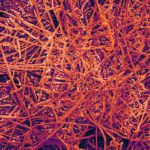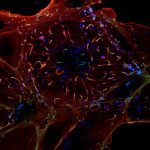Mélanie Hamon, head of the unit “Chromatin and infection”, was awarded a Chaire d’excellence by the French Ministry of Research for her project ‘ChromaBac – Bacteria driven chromatin modifications in health and disease’.
Mélanie Hamon’s team is studying the infection by Streptococcus pneumoniae, a bacteria naturally present in the upper respiratory tract of most people which can cause in some cases severe pneumonia and meningitis in children, killing each year more than 800,000 children under the age of five. In particular, they are interested in the interactions between bacteria and host chromatin and how the post-transcriptional modifications mediated by the bacterial infection can explain why some strains remain asymptomatic and why, in some cases, the host-bacteria homeostasis is disrupted and leads to invasive disease. They will first identify the key factors, either produced by S. pneumoniae or the host cells, that are involved in histone modifications. The team will then investigate how these modifications can explain the phenotypic responses of the host, both at the cellular and the organismal level. By improving our understanding of the role played by histone modifications that occur during an infection by S. pneumoniae, this project will open new horizons for future therapeutic strategies against virulent bacterial strains by targeting the epigenetic processes involved in these infectious diseases.



